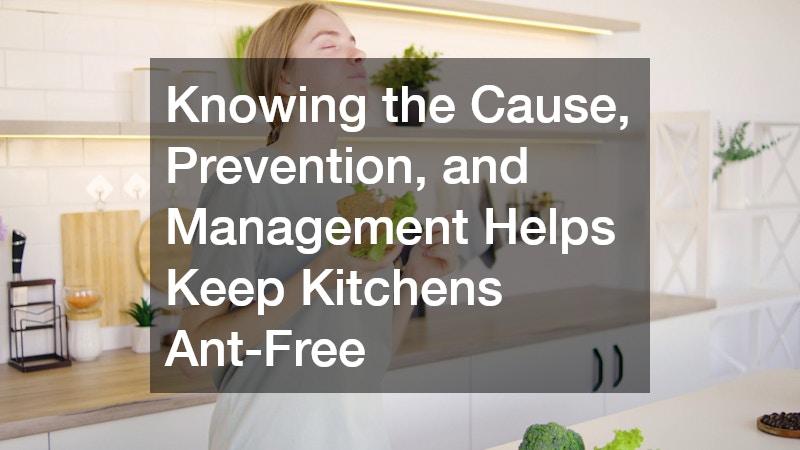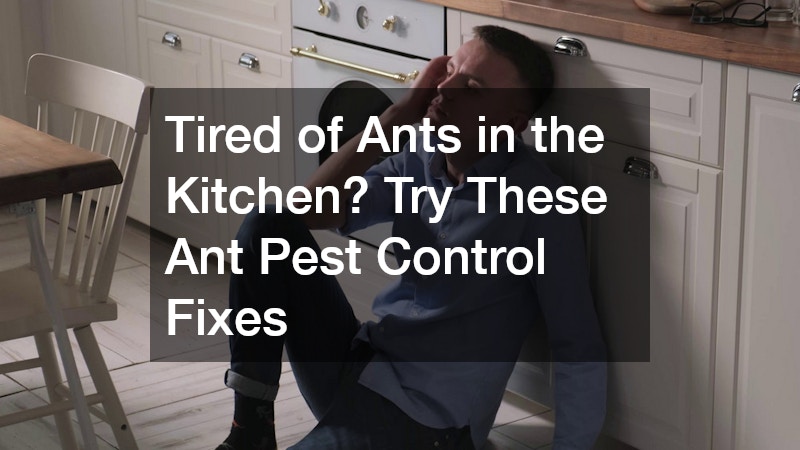Discover effective strategies to keep your kitchen ant-free. Understand why ants are a common problem in kitchens and how you can tackle this issue head-on.
What Are the Most Effective Natural Solutions to Control Ants?
Using Common Household Items
Ants are attracted to food, but certain household items can deter them effectively. Vinegar and lemon juice, when applied around entry points, can drive ants away due to their strong scent.
Mixing vinegar with water and using it as a spray is an easy and affordable way to manage ants. Furthermore, the acidic nature of lemon juice disrupts the scent trails that ants follow, causing disorientation.
Vinegar and lemon juice are eco-friendly and safe for indoor use, making them ideal for homes with pets and children. Regular application of these solutions can also prevent future infestations.
Natural Deterrents to Prevent Future Infestations
Diatomaceous earth is a natural powder that dehydrates insects, making it an effective tool against ants. Sprinkling it in areas where ants are present can eliminate them without the use of chemicals.
Essential oils like peppermint, tea tree, and eucalyptus are also potent ant deterrents. Their strong fragrances mask the scent trails ants rely on to navigate, thus keeping them at bay.
Using these natural deterrents not only helps in dealing with current ant problems but also prevents future occurrences. They are a safe alternative for those seeking non-toxic pest control methods.
How Can I Safely Use Chemical Ant Control Products?
Selecting the Right Products
When choosing chemical ant control products, prioritize those labeled for indoor use to ensure safety. Gel baits and ant traps are effective indoors as they target ants at the source, their colony.
Understanding the specific active ingredients in chemical products can help you avoid unnecessary exposure to toxic substances. Look for products that are EPA-approved for added peace of mind.
Choosing the right product is crucial in effectively managing ant infestations. Products that are designed for long-lasting results are often the most beneficial.
Proper Application and Safety Precautions
Read product labels thoroughly to ensure proper application and to minimize risks. Always use personal protective equipment when handling chemical pesticides to prevent irritation or exposure.
Applying products directly to ant trails and entry points can enhance their effectiveness. It’s important to keep treated areas inaccessible to children and pets until completely dry or settled.
Avoid mixing different chemical products, as it might lead to dangerous reactions. Following these safety precautions ensures that the use of chemical products is both effective and secure.
Are There Preventive Measures to Keep Ants Out of the Kitchen?
Maintaining a Clean Kitchen Environment
Regular cleaning can significantly reduce the chances of an ant infestation by eliminating food sources. Wiping down surfaces and storing food in sealed containers are crucial steps.
Crumbs, spills, and open containers can attract ants quickly, which is why a daily cleaning routine is advisable. Use strong-smelling cleaners like citrus-based solutions to deter ants.
A clean kitchen does not only promote hygiene but also acts as a defensive measure against pests. Maintaining this routine can save you from costly and labor-intensive treatments in the future.
Sealing Entry Points and Reducing Attractants
Identifying cracks and crevices where ants enter your home is essential in managing infestations. Use caulk to seal these points and prevent ants from finding a way inside.
Reduce outdoor attractants by trimming vegetation and clearing debris that can harbor ants near your home. Ensure garbage is sealed and dispose of it regularly to avoid attracting ants.
Effective management involves creating a barrier that ants can’t penetrate. These measures ensure that your kitchen remains ant-free by addressing outside attractants and entry points.
When Should I Consider Calling Professional Pest Control Services?
Assessing the Severity of the Infestation
Evaluating the extent of the infestation can help decide whether professional help is needed. Large or persistent ant problems often require the expertise of a pest control service.
If DIY efforts are not yielding results and the infestation persists, it might be time to call a professional. Professionals have access to advanced tools and solutions that are generally more effective.
Consider factors like infestation size, location, and duration when making your decision. Professional intervention can save time and prevent damage caused by unmanaged infestations.
Benefits of Professional Services
Professional ant pest control services offer comprehensive solutions that are usually more effective than DIY methods. They can provide customized treatment plans based on the specific ant species and infestation severity.
Professionals are trained to locate and eradicate health risks associated with pest infestations. Their experience and specialized equipment can ensure a safer, more efficient pest management process.
Hiring experts reduces the risk of injury or mishandling of chemicals that can occur with DIY treatments. The long-term cost savings and peace of mind can outweigh the initial investment in professional services.
Summarize the key points discussed and empower readers with confidence to tackle their ant issues using the provided strategies. Whether opting for natural remedies or chemical solutions, preparedness enhances the efficacy of your actions.
Understanding cause, prevention, and management can lead to a consistently ant-free kitchen environment. With these strategies, readers can confidently address and prevent ant infestations.

